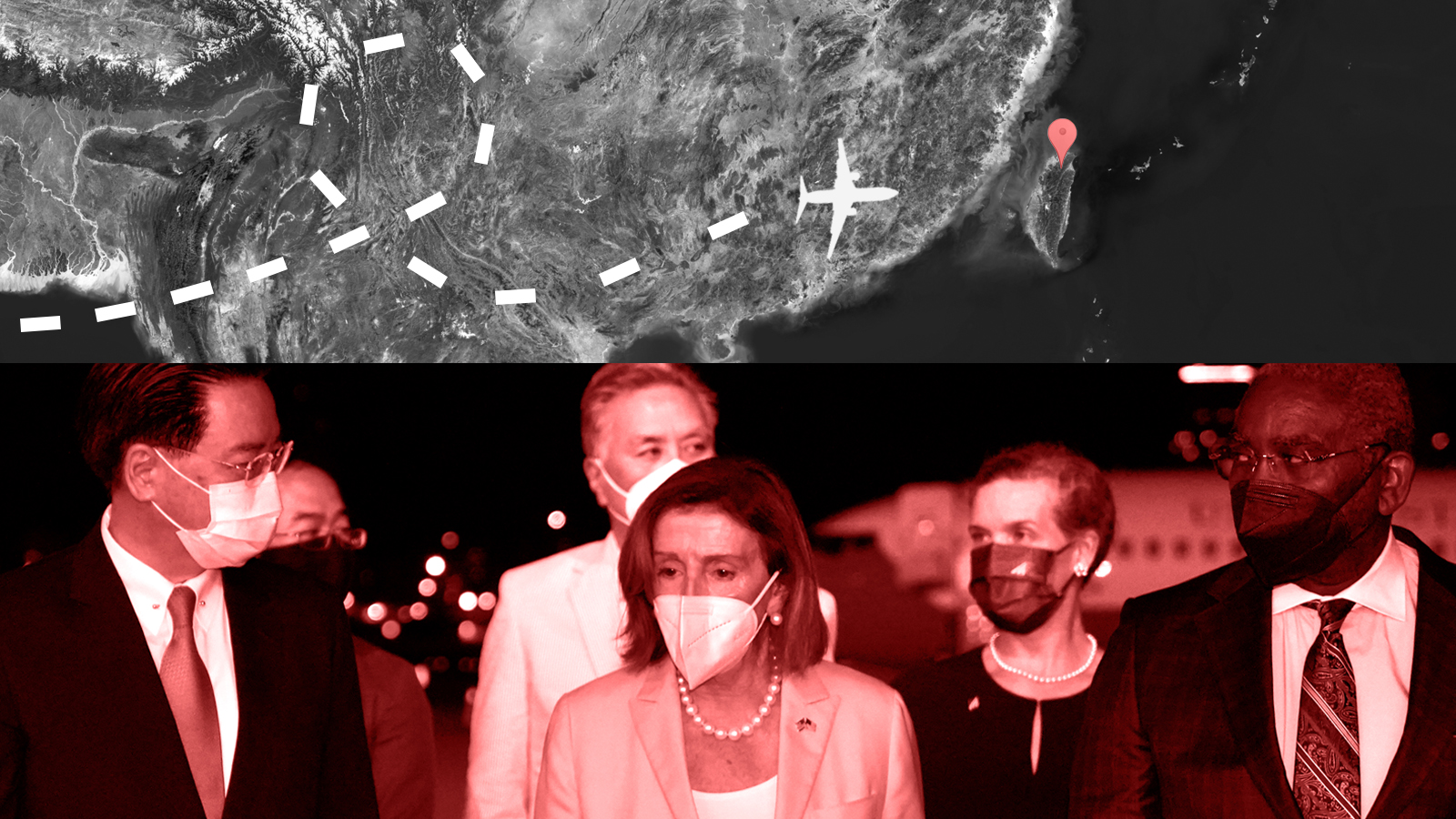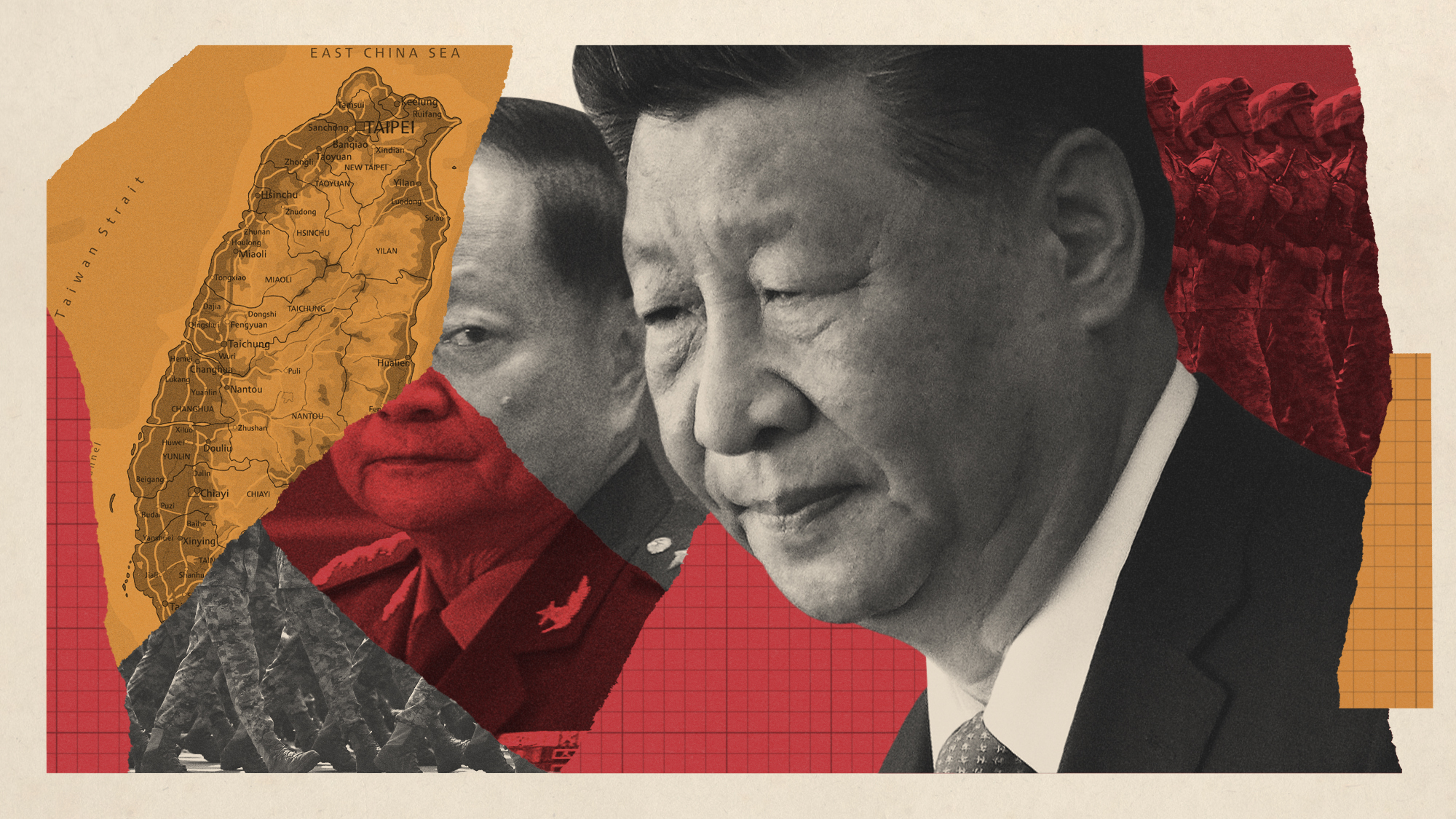Should Pelosi have gone to Taiwan?
The sharpest opinions on the debate from around the web


A free daily email with the biggest news stories of the day – and the best features from TheWeek.com
You are now subscribed
Your newsletter sign-up was successful
Nancy Pelosi (D-Calif.) officially landed in Taipei, Taiwan Tuesday evening, prompting outrage (and even a military show of force) from Chinese officials. Furious the speaker of the House is using her trip to Asia to diplomatically engage with a territory Beijing considers its own, the Chinese Ministry of Foreign Affairs has claimed the visit damages "the political foundation of China-U.S. relations," "seriously infringes upon China's sovereignty and territorial integrity," and "gravely undermines peace and stability across the Taiwan Strait," it said in a statement released after she landed. And it's not like Beijing didn't know the speaker was coming — such a Taiwan stopover has been speculated about for weeks. But at the end of the day, however, should Pelosi even be doing this? Do the pros of her visit, slated to end Wednesday, outweigh the cons? Here's a taste of what experts and pundits have to say about the island expedition, the first for a House speaker in 25 years:
Think of Ukraine
For starters, Pelosi's visit risks further complicating the war in Ukraine, especially considering U.S. attempts to ensure China's neutrality. Beijing and Moscow are allies, but the Biden administration has, "by all indications," successfully convinced the former to hold off on providing Russian President Vladimir Putin with military aid that might perhaps bolster the chances of his invasion. "Given all of that," Thomas Friedman argued in The New York Times, "why in the world would the speaker of the House choose to visit Taiwan and deliberately provoke China now … ?"
The Ukraine war is "SO not over, SO not stable, SO not without dangerous surprises that can pop out on any given day," Friedman continued. "It is Geopolitics 101 that you don't court a two-front war with the other two superpowers at the same time."
The Week
Escape your echo chamber. Get the facts behind the news, plus analysis from multiple perspectives.

Sign up for The Week's Free Newsletters
From our morning news briefing to a weekly Good News Newsletter, get the best of The Week delivered directly to your inbox.
From our morning news briefing to a weekly Good News Newsletter, get the best of The Week delivered directly to your inbox.
Think of China, too
Not only might the trip exacerbate the war in Ukraine, it could also serve as the "single spark that ignites the "combustible situation" between the U.S. and China, Bonnie Glaser of the German Marshall Fund of the United States and Zack Cooper of the American Enterprise Institute wrote for the Times.
"Neither side needs a war. And from a U.S. strategic standpoint, this is a particularly bad issue to pick a fight with China over," they said.
Plus, will this even help?
Meanwhile, one also has to wonder what Taiwan might get out of all this attention. Yes, it's true the visit from Pelosi will likely signal U.S. support for the island, but outside of that, how does Taiwan benefit, if at all?
"Other than grandstanding, there are no tangible benefits attached to Pelosi's visit," Defense Priorities fellow Daniel DePetris wrote for Time. "The costs, however, will be a U.S.-China relationship that continues to travel down the path of a full-blown strategic rivalry, where responsible competition and dialogue are increasingly viewed by both sides as a sign of weakness."
A free daily email with the biggest news stories of the day – and the best features from TheWeek.com
Writing for the Los Angeles Times, political science professor Dennis Hickey appeared to share DePetris' attitude: "It is difficult to understand how a Pelosi trip would help Taiwan. If the dispute over Pelosi's travel plans spirals out of control, the biggest loser will be Taiwan."
Instead of "high-profile but ultimately empty visits," added the Financial Times Editorial Board, the U.S. "should in future focus on carefully-coordinated actions that have genuine value in shoring up Taiwan's security," like bolstering weapons supplies and training.
It's a gamble, but it's her right
Pelosi's visit puts the Biden administration in a tough spot — even if White House officials preferred she hadn't gone, urging her to cancel the trip could've played right into Beijing's hands and convinced them they won the stand-off. And President Biden couldn't come right out and publicly encourage the speaker to delay either, lest he look too wishy-washy on Taiwan. Ultimately, the best-case scenario may have been some sort of compromise between Pelosi and the Biden team — but either way, the speaker has every right to fly to Taiwan and every right to visit the island, posited Washington Post columnist Josh Rogin.
"In democracies, the people and their representatives can visit other democracies whenever they want, without being punished by neighboring dictatorships," Rogin wrote. "That's a strength, not a weakness, of free societies."
She should have gone eventually — but maybe not now
Pelosi has both a right and an obligation to "express solidarity with democratic Taiwan as she sees fit," The Washington Post Editorial Board argued, but "[t]here is a time and a place for everything." And that moment was ... maybe not right now. It probably won't be soon, either, "but it should be eventually, when her presence will do the most to support Taiwan's legitimate aspirations and the least to reinforce China's illegitimate bullying."
Arguing somewhat similarly, The Wall Street Journal Editorial Board opted to address not the timing of Pelosi's visit but instead how it underscores the need to better address and handle Taiwan as a "U.S.-China flashpoint." Regardless of how the speaker's trip plays out, "China's military threats show that the status of Taiwan and its protection are fast becoming emergencies," the board said. For the U.S., the "best response" here would be "at long last" to take the defense of the island "seriously."
Brigid Kennedy worked at The Week from 2021 to 2023 as a staff writer, junior editor and then story editor, with an interest in U.S. politics, the economy and the music industry.
-
 Health insurance: Premiums soar as ACA subsidies end
Health insurance: Premiums soar as ACA subsidies endFeature 1.4 million people have dropped coverage
-
 Anthropic: AI triggers the ‘SaaSpocalypse’
Anthropic: AI triggers the ‘SaaSpocalypse’Feature A grim reaper for software services?
-
 NIH director Bhattacharya tapped as acting CDC head
NIH director Bhattacharya tapped as acting CDC headSpeed Read Jay Bhattacharya, a critic of the CDC’s Covid-19 response, will now lead the Centers for Disease Control and Prevention
-
 The UK expands its Hong Kong visa scheme
The UK expands its Hong Kong visa schemeThe Explainer Around 26,000 additional arrivals expected in the UK as government widens eligibility in response to crackdown on rights in former colony
-
 ‘Hong Kong is stable because it has been muzzled’
‘Hong Kong is stable because it has been muzzled’Instant Opinion Opinion, comment and editorials of the day
-
 What do Xi’s military purges mean for Taiwan?
What do Xi’s military purges mean for Taiwan?Today’s Big Question Analysts say China’s leader is still focused on reunification
-
 What is at stake for Starmer in China?
What is at stake for Starmer in China?Today’s Big Question The British PM will have to ‘play it tough’ to achieve ‘substantive’ outcomes, while China looks to draw Britain away from US influence
-
 ‘It’s good for the animals, their humans — and the veterinarians themselves’
‘It’s good for the animals, their humans — and the veterinarians themselves’Instant Opinion Opinion, comment and editorials of the day
-
 The billionaires’ wealth tax: a catastrophe for California?
The billionaires’ wealth tax: a catastrophe for California?Talking Point Peter Thiel and Larry Page preparing to change state residency
-
 What is China doing in Latin America?
What is China doing in Latin America?Today’s Big Question Beijing offers itself as an alternative to US dominance
-
 Bari Weiss’ ‘60 Minutes’ scandal is about more than one report
Bari Weiss’ ‘60 Minutes’ scandal is about more than one reportIN THE SPOTLIGHT By blocking an approved segment on a controversial prison holding US deportees in El Salvador, the editor-in-chief of CBS News has become the main story
